I also tracked Mary’s son Thomas (abt. 1747 – 1805), my direct ancestor, from Frederick to Wythe County, Virginia, where he died. I’m now following the lines of Thomas’s children by his wife Margaret, who was probably the Margaret Beaumont/Beaman/Beamon who married Thomas Brooks in Christ Church parish, Middlesex County, Virginia, on 29 January 1771 (documentation is provided in the posting linked at the head of this paragraph).
I have finished a series of postings on Thomas and Margaret’s oldest child, a daughter Sarah (1771 – 1857), who married John Lahue, and on their next child, a son James (1772 – 1835), who married Nancy Isbell. Thomas and Margaret Brooks’s next child after James (or could James and Margaret have been twins?—I’ll say more about the pattern of twin births in multiple Brooks lines in my next posting) was a daughter Margaret, who was, it seems apparent, born in 1772 in Frederick County, Virginia.
Margaret Brooks’s Date of Birth and Death
Two sources provide (conflicting) information about Margaret’s year of birth. Her death record in the death register of Grayson County, Kentucky, where Margaret died, states that she died in 1857, aged 75 (see the image at the top of the posting).[1] Note the problem here: If Margaret was 75 when she died in 1857, she would have been born in 1782, and that date is a decade older than the date of birth suggested by the 1850 federal census, which fits much better with other data we have about Margaret.
The 1850 federal census for Grayson County shows Margaret and husband Joseph Day living in the household of their son Jacob, and states that Margaret is 78 years old and was born in Virginia.[2] This document places her birth in 1772, then, and not 1782, with 1772 being much more likely as her year of birth, given that it appears Margaret’s first child was born in or around 1793. When Margaret died seven years after the 1850 census was taken, she would probably have died at the home of her son Jacob, who is buried in the Shain cemetery at Short Creek in Grayson County.[3] Margaret and husband Joseph are thought to be buried in the same cemetery, but if so, no tombstone markers are now extant.
Returning to Margaret’s death record in the Grayson County, Kentucky, death register: The day and month of Margaret’s death in 1857 are not filled in, and the names of her parents and place of birth are also left blank. The death record states that Margaret died of old age. It’s possible that the line drawn where the day and month of death should have been written is intended to indicate that Margaret died on 2 December, the date immediately above Margaret’s listing. The same page of the 1857 Grayson County death register on which Margaret’s death is recorded lists the death of her sister Sarah Brooks Lahue on 13 February 1857.
Elsie Spry Davis, a researcher and descendant of this Brooks-Day family who published a book in 1994 entitled Three Generations of Days and Their Wives: Joseph and Margaret Brooks Day, Joseph and Catherine Yarnell Day, John and Lydia Ross Day, thinks that Margaret Brooks married Joseph Day about 1792.[4] Davis is basing this marriage date on the fact that, as she concludes, Joseph and Margaret had a son born about 1793.[5] I’ve concluded that Joseph and Margaret were likely married by 1790, and will explain my reasons for thinking this in a moment. Again, note that if Margaret was born in 1782, she couldn’t have married in 1790-2.
The Day Family in Frederick County, Virginia
Joseph Day was the son of an older Joseph Day and wife Catherine Yarnall/Yarnell. Up to the point at which Joseph and his parents left Frederick County for Botetourt and Montgomery County, Virginia, in 1787, there’s good documentation for the family, particularly in the minutes of the Friends’ meeting in Frederick County, Hopewell, to which the Days belonged before Hopewell minutes show some members of the family, including Joseph Sr. and Jr., being expelled for various infractions.
Note that the Days were yet another of the families connected with this Brooks family of Frederick County, Virginia, that had Quaker roots. As we’ve seen, Jacob Hollingsworth, who married Mary, daughter of Mary Brooks of Frederick County, was from a Quaker family, though his mother Barbara Shewin Hollingsworth had married outside the Quaker community and from that point Jacob’s branch of this family ceased being Quakers. And the Roach family into which Ruth Rice, daughter of Elizabeth Rice, another daughter of Mary Brooks of Frederick County, was also a Quaker family. The multiple ties of this Brooks family of Frederick County to families with Quaker roots make me wonder if there were similar roots in the background of the Brooks family.
According to Elsie Davis, Joseph Day Sr., father of Joseph Day who married Margaret Brooks, was a merchant of Philadelphia at the time he married Catherine Yarnall/Yarnell on 10th day of 6th month 1762 at the Philadelphia monthly Friends’ meeting; Joseph was born 7th day of 10th month 1740 in Chester County, Pennsylvania.[6] Catherine Yarnall/Yarnell was the daughter of Mordecai Yarnall, a minister of the Society of Friends, and of Catherine Meredith. Joseph was the son of John Day and Lydia Ross of the Nottingham monthly Quaker meeting in Chester County, Pennsylvania.
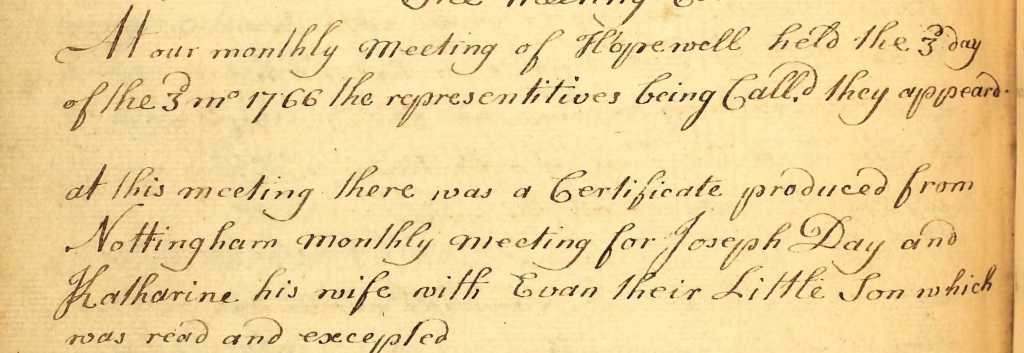
The minutes of Hopewell Friends’ monthly meeting in Frederick County, Virginia, show Joseph Day and wife Catherine (her name is given here as Katharine) and their “Little Son” Evan being received by the Hopewell meeting on 3rd day of 3rd month 1766, with a certificate of removal from the Nottingham meeting.[7]
Joseph Day appears in a variety of records in Frederick County after he and his family settled there in 1766, including both the Hopewell minutes and civil records. As I noted previously, the availability of good records for the Days in Frederick County makes it fairly easy to obtain a good picture of them in that county. After they left Frederick County in 1787 or 1788, however, the picture becomes somewhat murkier for reasons I’ll explain in a moment.
On 25 January 1770, along with Cuthbert Hayhurst and Edward Dodd, Joseph witnessed a codicil to the will of William Jolliffe.[8] There are thick interconnections between the Jolliffe family and the Ross family, the family of Joseph Day’s mother Lydia Ross Day. The William Jolliffe whose will codicil Joseph Day witnessed in 1770 was the son of an older William Jolliffe Sr. (about 1695 – 1765), a prominent member of the Hopewell meeting known as the “Quaker lawyer” since he handled most of the business of the meeting, who had Pennsylvania roots and lived adjacent to Alexander Ross, Joseph Day’s grandfather, and Cuthbert Hayhurst.[9]
William Jolliffe’s son William Jr. (1720/1 – 1770) married Lydia Hollingsworth, widow of John Ross, in September 1750. John Ross (1712 – 1748) was a brother to Lydia Ross, Joseph Day’s mother. Alexander Ross, father of Lydia Ross Day and John Ross, lived contiguous to William Jolliffe Sr. in Frederick County, as I’ve just noted.[10] He was a mover and shaker of the local Quaker community, having brought seventy Quaker families from the middle colonies in 1734 to settle on Opequon Creek in Frederick County, where Ross had a grant of 10,000 acres.[11]
William Jolliffe Jr. was a well-to-do merchant and miller of Frederick County who lived just north of Winchester on the Great Road at a house known as the Red House. His wife Lydia Hollingsworth (Ross) was, it’s worth noting, a cousin of the Jacob Hollingsworth who married Mary Brooks, aunt of Margaret Brooks Day. By her husband John Ross, Lydia had a son Stephen Ross who, as we’ll see in a moment, is mentioned in deeds of Joseph Day and his wife Margaret in Frederick County. Prior to the removal of both the Day and Ross families to Frederick County, Stephen Ross had been apprenticed to his uncle John Day at East Nottingham, Chester County, Pennsylvania, to learn the tanning trade.[12]
As a previous posting notes, the bible of Patrick Rice, published in London in 1759 by Thomas Baskett, states that Patrick bought the bible on 13 September 1771 — obviously in Frederick County, Virginia, where both the Rices and Days were living in 1771. Patrick Rice’s son George Rice married Elizabeth Brooks, a sister of Thomas Brooks, the father of Margaret Brooks who married Joseph Day.
Following the death of John Day in 1775 (or perhaps prior to this, with the land passing legally to Joseph in 1775), Joseph and Catherine settled on a lot on the Great Road outside Winchester near William Jolliffe that John had willed to his son Joseph. John had bought the land from Stephen Ross, the nephew of his wife Lydia Ross Day and son of Lydia Hollingsworth through her marriage to John Ross. From several deeds Joseph made in the years in which he lived in Frederick County, especially when he and Catherine sold their homeplace to Richard Ridgway on 4 December 1787, we know that Joseph and Catherine lived on this land up to the point they left the county in 1787.[13] The deed for this land sale states that Joseph had acquired the land he was selling to Ridgway from his father John Day, who bequeathed it in his will to Joseph, and John had gotten the land from Stephen Ross, who bought it from Samuel Litler and wife Elizabeth.
I think it’s likely that Joseph and Catherine had actually lived on the lot his father bought from Stephen Ross from the time the Days arrived in Frederick County, with Joseph obtaining legal ownership of it at his father’s death. A 6 March 1784 mortgage that Joseph and Catherine made to Gavan Lawson also speaks of this 6½-acre lot that had previously belonged to Stephen Ross.[14] Various indicators in legal documents of Joseph and Catherine Day in Frederick County suggest to me that, like William Jolliffe Jr., they had some kind of business establishment on the Great Road outside Winchester, as Jolliffe did. Elsie S. Davis’s book about the Day-Brooks family has a photograph of the house in which Joseph and Catherine Day lived in Frederick County, which was called Snow Hill.[15]
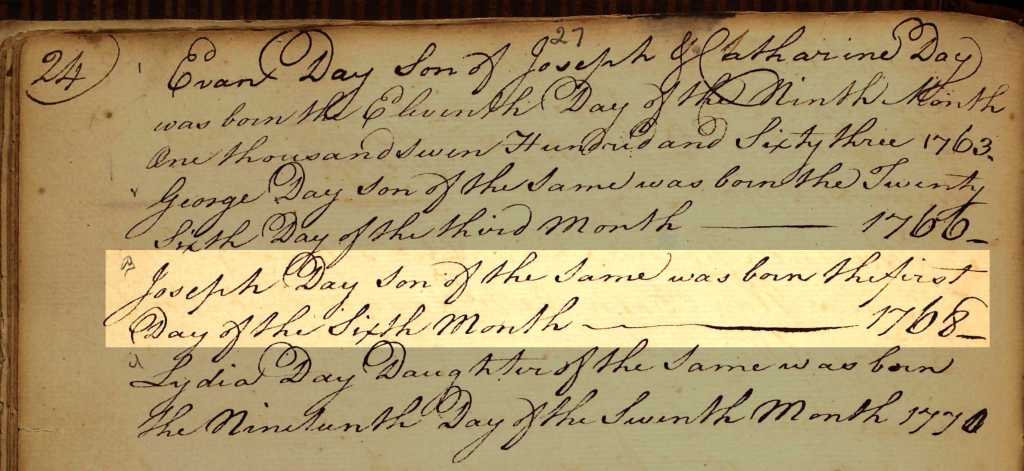
Within two years after Joseph and Catherine Day moved from Pennsylvania to Frederick County, their son Joseph was born. Joseph Jr.’s birth on 1st day 6th month 1768 is recorded in the minutes of the Hopewell meeting.[16] This record gives us a precise date of birth for Joseph Jr. and tells us he was born in Frederick County, Virginia.

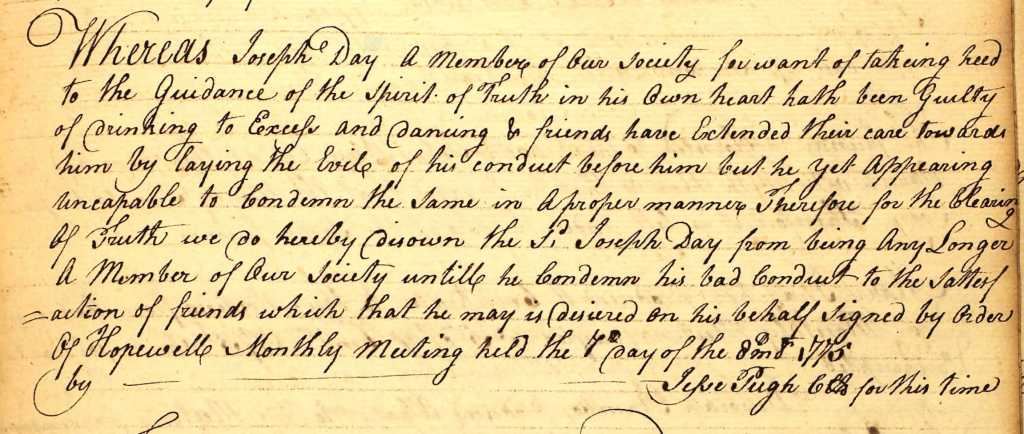
By 1772, Joseph Day Sr. began to experience difficulty with the Hopewell community. Hopewell minutes show that on 6th day of 1st month 1772, a complaint was filed against Joseph for drinking liquor to excess and dancing.[17] Hopewell minutes show members of the meeting working with Joseph regarding this charge and reporting to the meeting on 3rd day 1st month 1774 that he was not prepared to admit his fault. The minutes show the case continued on 6th day of 3rd month 1775, 3rd day of 4th month 1775, and 4th day of 9th month 1775. On 2nd day of 10th month 1775, the Hopewell meeting disowned Joseph due to the charge of drinking to excess, for which he had not admitted fault.[18]
On 27 November 1782, Joseph Day bought from Daniel Dillon and wife Lydia of Guilford County, North Carolina, 171 acres lying near the dividing line of Opequon and Back Creek in Frederick County[19] The land adjoined Josiah Ridgway, William Dillon, and William Jolliffe.
On 6 March 1784, Joseph and Catherine Day made the mortgage to Gavan Lawson mentioned above.[20] The mortgage states that Joseph Day and Catherine his wife of Frederick County were indebted to Gavan Lawson of Culpeper County, a merchant, for £693 19s. Joseph mortgaged to Lawson 6½ acres he had acquired from Stephen Ross, 23¼ acres he bought from John Littler adjoining the former, and 27 acres near the previous two lots across the Great Road that he had bought from George Ross. The mortgage shows Joseph signing, an indicator that he was literate, with witnesses Mary Jolliffe, Lewis Walker, Alexander White, Solomon Hoge, Thomas Campbell, and Robert White Jr. On 6 October 1784, Alexander and Robert White proved the deed, and on 2 November 1784 Solomon Hoge proved it and it was recorded.
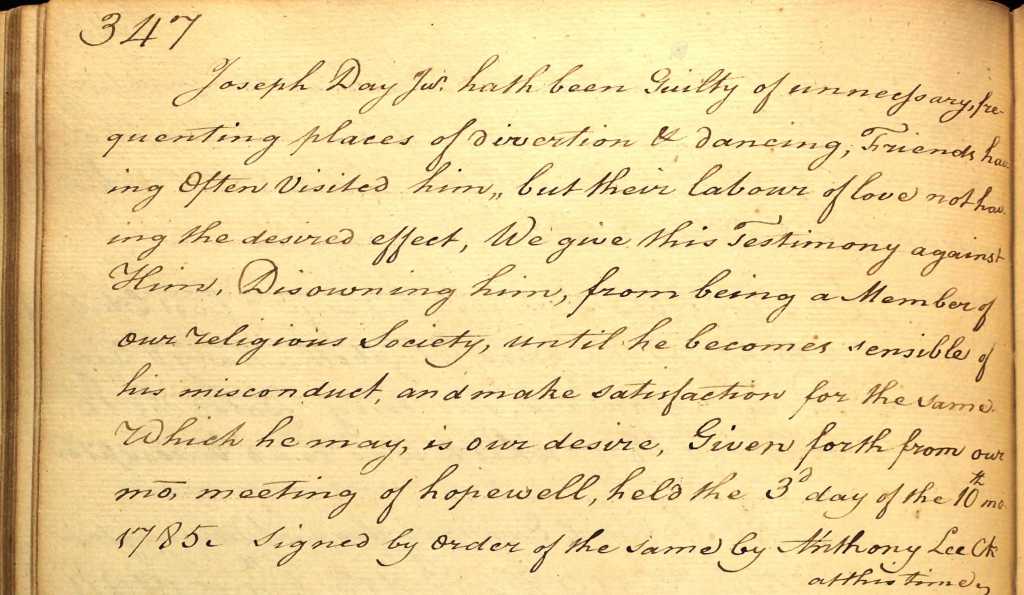
In the following year on 7th day of 3rd month 1785, Joseph Day Jr. and his brother Evan appear along with Thomas Littlejohn in the Hopewell meeting minutes accused of frequenting places of diversion and dancing.[21] Hopewell minutes for 4th day of 4th month 1785 report that Friends had met with these men to bring them to repentance, and on 5th day of 9th month 1785, Hopewell minutes say that Friends were still working with Joseph, Evan, and Thomas Littlejohn. The outcome: on 3rd day 10th month 1785, the meeting disowned Joseph Day Jr.[22]
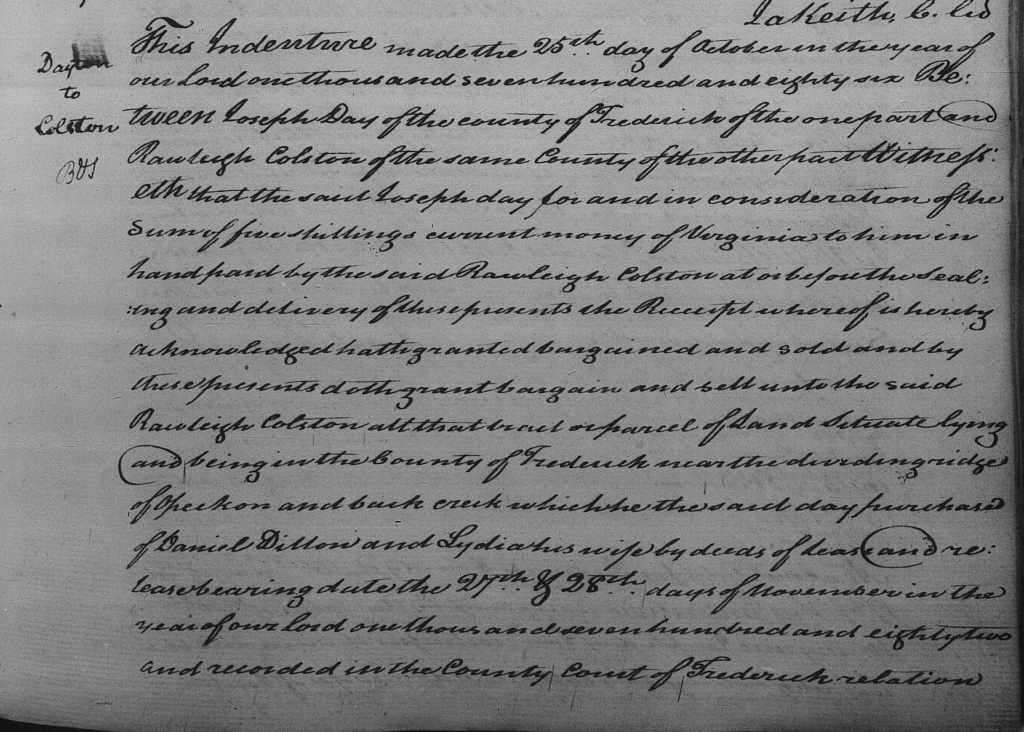
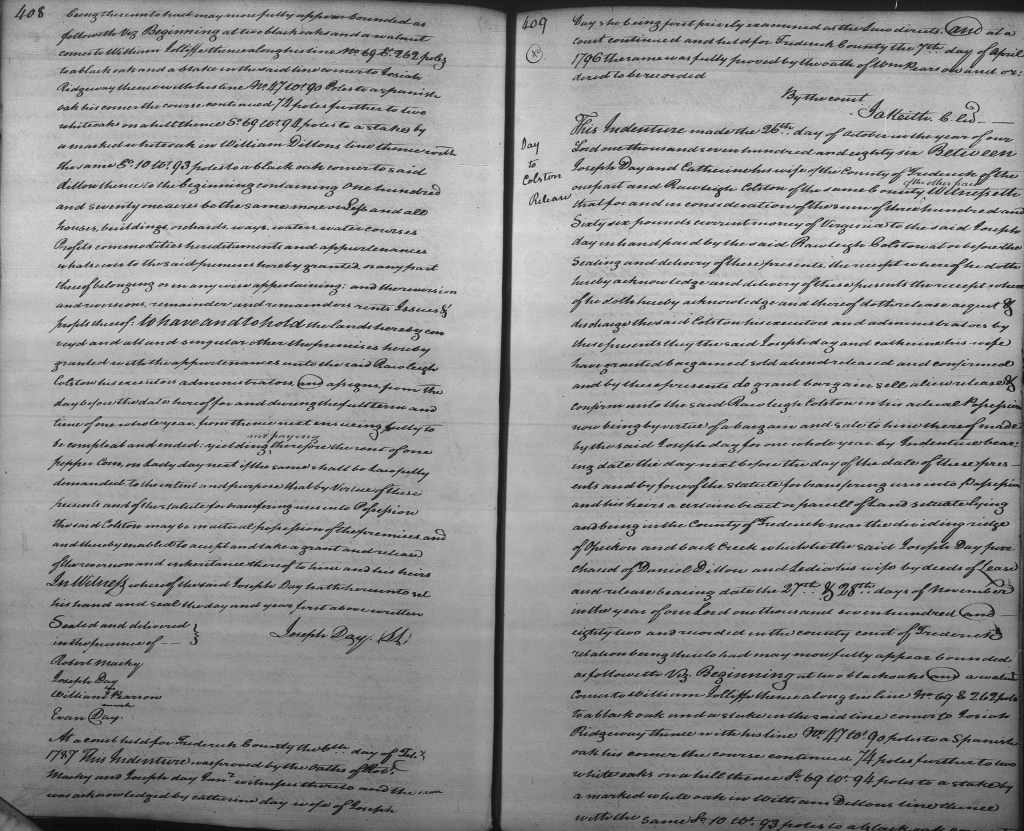
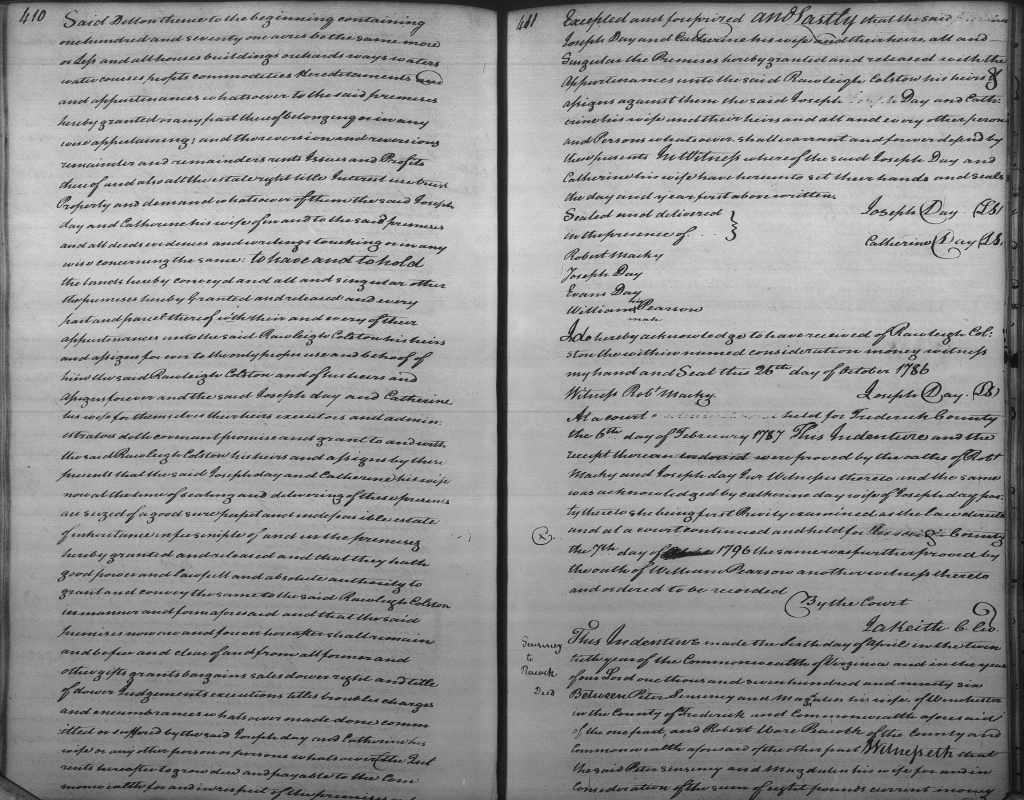
On 25 October 1786, Joseph Day Sr. sold to Rawleigh Colston, both of Frederick County, the land he had bought in November 1782 from Daniel Dillon.[23] Robert McKay, Joseph Day Jr., William Pearson, and Evan Day witnessed the deed. Joseph signed, as did all witnesses except Pearson. On 6 February 1787, Robert McKay and Joseph Day Jr. proved the deed with Catherine Day acknowledging, and Pearson then proving the deed on 7 April 1796, when it was recorded. Note that Joseph Jr. had turned 18 by the time he witnessed this document.
On 17 November 1787, Gavan Lawson “late of Culpeper County,” merchant, released Joseph and Catherine Day of Frederick County from the mortgage they had made to him on 6 March 1784.[24] This document notes that Joseph and Catherine had paid Lawson £300 of the £693 pounds 19s they owed him, and lists the parcels of land they had mortgaged to him, noting that Joseph and Catherine lived on the 6½-acre tract that had previously belonged to Stephen Ross. Robert Haines, Joseph Steer Jr., and James Wright witnessed the mortgage release. Haines and Wright proved the document 4 December 1787, with a notation in the record that both were Quakers who had not made oath, and on 5 February 1788, Joseph Steer proved it.
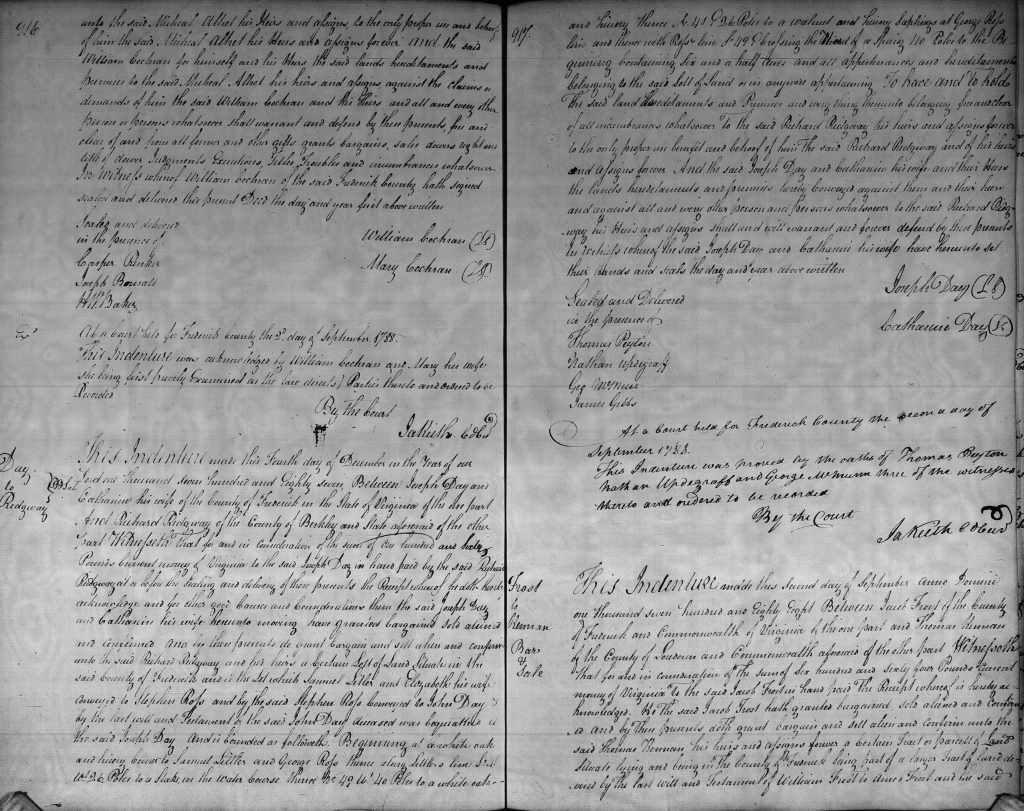
On 4 December 1787, Joseph and Catherine sold their homeplace in Frederick County to Richard Ridgway of Berkeley County, Virginia.[25] The deed states that they sold their 6½ acres to Ridgway for £160 pounds, and as noted above, rehearses the list of owners of the tract. The lot adjoined Samuel Litler and George Ross. Both Joseph and Catherine Day signed the deed, with witnesses Thomas Peyton, Nathan Updegraf, George McNear, and James Gibbs. On 2 September 1788, Peyton, Updegraf,and McNear proved the deed, and it was recorded.
The Days Move to Montgomery and Botetourt Counties, Virginia
After selling their homeplace in Frederick County to Richard Ridgway in December 1787, Joseph and Catherine Day left Frederick County and settled in a few years in Botetourt County, Virginia. As Elsie Davis notes, they last appear on the tax list in Frederick County in 1787, after they had been listed on the tax list in 1783 and 1785, and 1787.[26] The 1787 tax listing shows entry shows Joseph listed with his oldest son Evan Day in the column reserved for males in the household over 21.[27] Evan was 24 years old in 1787. The tax listing also indicates that the household had 1 white male above 16 and under 25, as well as 2 horses and 2 cows.

According to Elsie Davis, following the December 1787 sale of his Frederick County homeplace, Joseph Day then shows up in 1789 on a tax list in Botetourt County, Virginia.[28] I don’t find Joseph Day on the tax list in Botetourt in 1789, however. What I do find is that a Joseph Day is listed on the tax list in 1787, 1788, and 1789 in Montgomery County, Virginia.[29] After 1789, Joseph Day drops from the Montgomery tax list altogether, and in 1790, Joseph Day Sr. and Jr. begin to appear, with those designations, on the tax list in Botetourt County.[30] In my view, after selling their property in Frederick County in 1787, the Days moved first to Montgomery County and then Botetourt a few years later. If the Joseph Day on the tax list in Montgomery in 1787 is Joseph formerly of Frederick County, as I think it is, he and wife Catherine may already have gone down to that county by the time they sold their Frederick homeplace in December 1787, in fact, though the deed for that sale states that they were of Frederick County.
Elsie Davis notes that a Joseph Day appears on the 1789 tax list in Montgomery County, stating that because he owned four horses, this would seem not to be a younger man (i.e., Joseph Day Jr.) just starting his adult life, but an older man.[31] She also notes the presence of a Joseph Day in Montgomery County holding land on the middle fork of Elk Creek of New River some ten miles from where Thomas Brooks, father of Margaret Brooks Day, would settle when he moved from Frederick County to Wythe County in 1792.[32] But she is uncertain whether this Joseph Day is Joseph with wife Catherine.
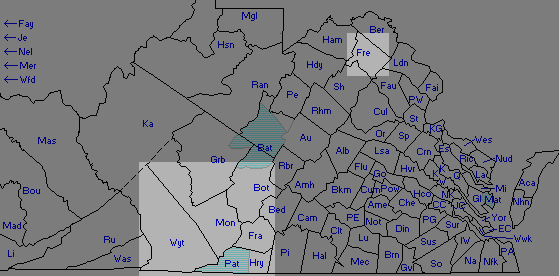
As the map above from the Map of US website charting the location of Virginia counties in 1790 shows, Wythe, where the Brooks settled, is contiguous to Montgomery. In fact, Wythe was cut out of Montgomery in 1790. And Montgomery is contiguous to Botetourt. The map above shows the situation of these counties relative to each other after Wythe was cut out of Montgomery in 1790.

From 1790 up to 1798, when Botetourt records suggest to us that Joseph Day Sr. died in that county, the tax list in Botetourt consistently shows Joseph Day Sr. living in that county, with his son Joseph Jr. sometimes enumerated alongside him. Neither Joseph is on the Botetourt tax list prior to 1790, an indicator that they arrived there in 1790. The two Josephs are listed side by side in 1790, designated as Sr. and Jr., and again in 1794, 1795, and 1796. The Botetourt tax list for 1791-3 and 1797 shows only Joseph Sr.
Joseph Day Jr. was of age by 1790 — he’d have been 22 in that year — and that he’s taxed in Botetourt County in that year as head of a household with one white male over 21 and one horse listed in the household suggests to me that he had married Margaret Brooks by 1790.[33]
As I’ve stated, it appears to me that the Days likely left Frederick County in 1787. Margaret Brooks’s family was still in Frederick County at that time. As we’ve seen previously, Margaret’s father Thomas Brooks is on the Frederick County tax list up to 1792, when he drops from the tax list there to reappear in 1793 on the tax list in Wythe County, Virginia. This indicates to me that the Brooks family left Frederick for Wythe County in 1792, five years after the Days left Frederick.
I think it’s likely that Joseph Day Jr. and Margaret Brooks either married in Frederick County, Virginia, just as the Day family left Frederick County, and Margaret and her husband Joseph moved along with his parents to Montgomery then Botetourt County, or having met Joseph Day Jr. in Frederick, Margaret joined the Day family in Botetourt by 1790 and married Joseph there, two years before her parents and siblings went to Wythe County. Margaret would have been 18 years old in 1790 (assuming that the 1850 census gives her age correctly).
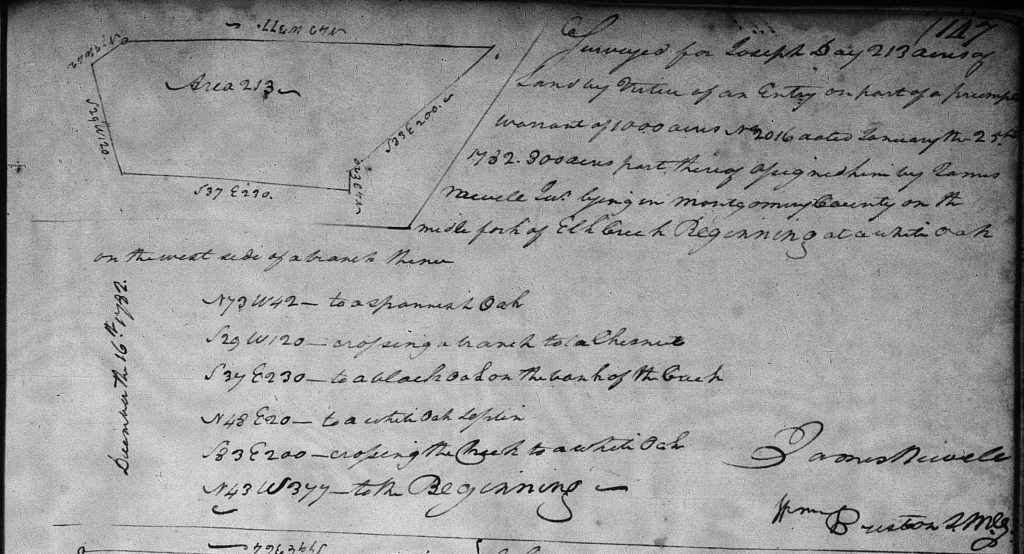
So back to the Joseph Day who had land on the Middle Fork of Elk Creek of New River in Montgomery County, a point I mentioned previously: On 4 September 1782, Joseph Day patented 300 acres in Montgomery County on the Middle Fork of Elk Creek. This land was assigned to Joseph Day by James Newell Jr., assignee of Michael Woods, out of a warrant for 1000 acres, #2016.[34] The plat and survey show Joseph receiving 213 acres out of the 300 assigned to him, with William Preston as surveyor on 16 December 1782. This Joseph is evidently Joseph Sr., and he was, it seems to me, acquiring land in Montgomery County before he moved there, while he was apparently still living in Frederick County.
The name James Newell stands out here. As we’ve seen previously, he was a neighbor of Thomas Brooks after the Brooks family moved in 1792 to Wythe County, and he appears in a number of records of the Brooks family, including as witness to the sale of land by Thomas and Sarah Herbert to Thomas Brooks in 1804, and as appraiser of Thomas Brooks’s estate in 1805.
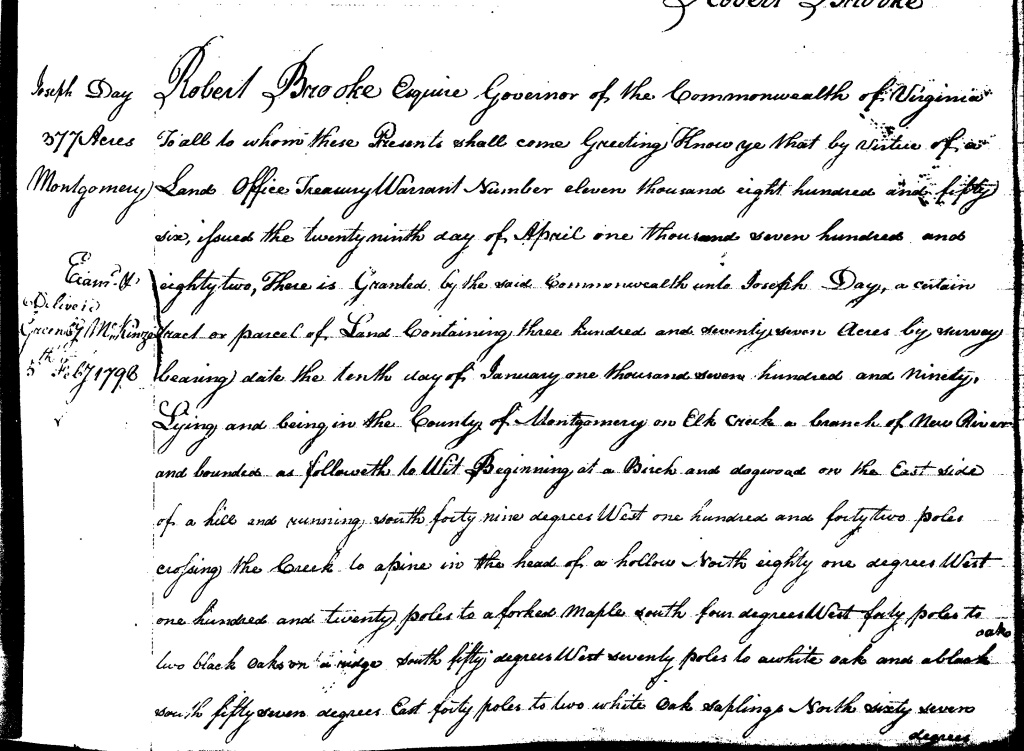
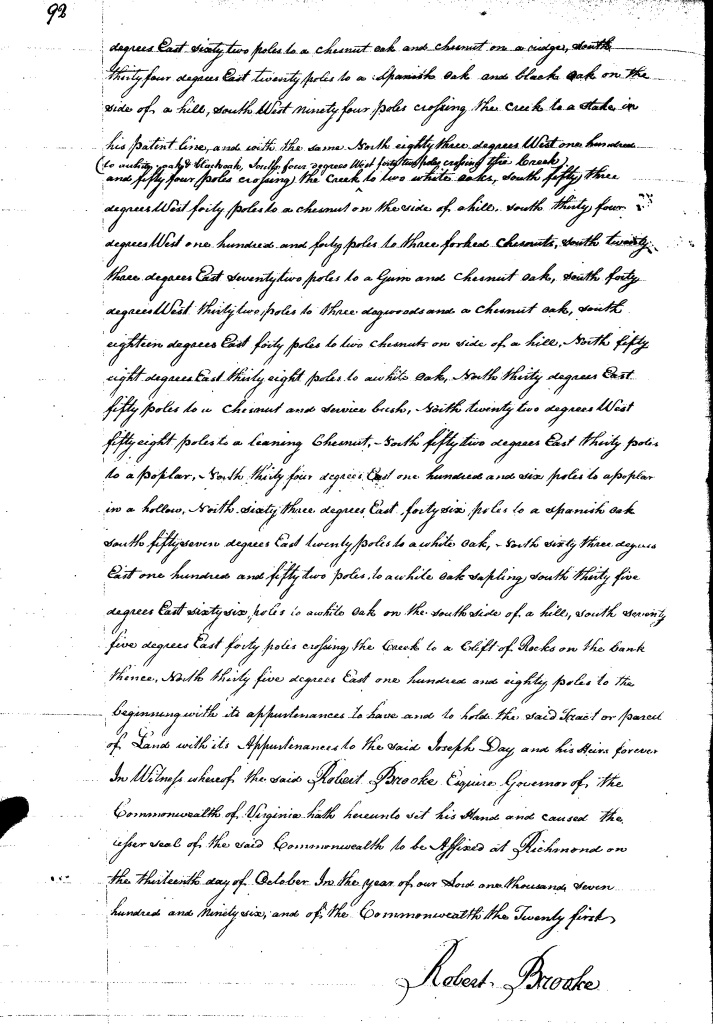
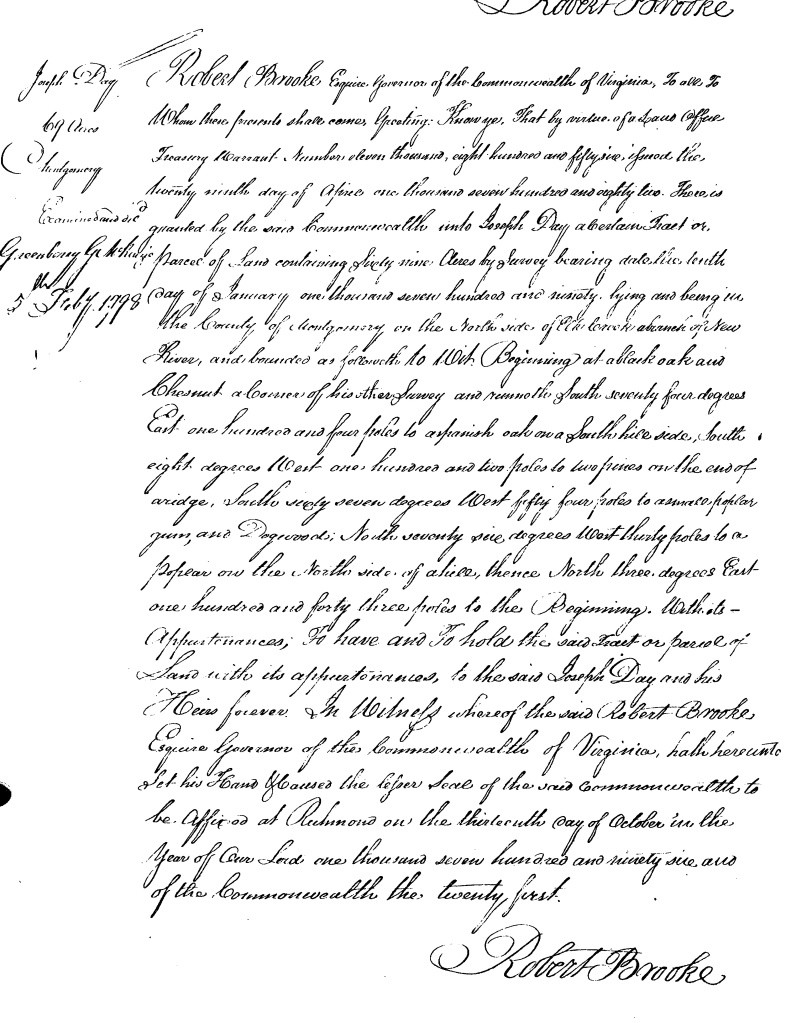
Kegley shows Joseph Day (Senior) again entering land on Elk Creek in Montgomery County on 20 June 1786, 90 acres on the north side of a fork of Elk Creek of New River, out of 300 acres from a treasury warrant. The land was at Day’s old corner.[35] This land was from the 300 acres assigned by James Newell Jr. to Joseph day discussed previously.
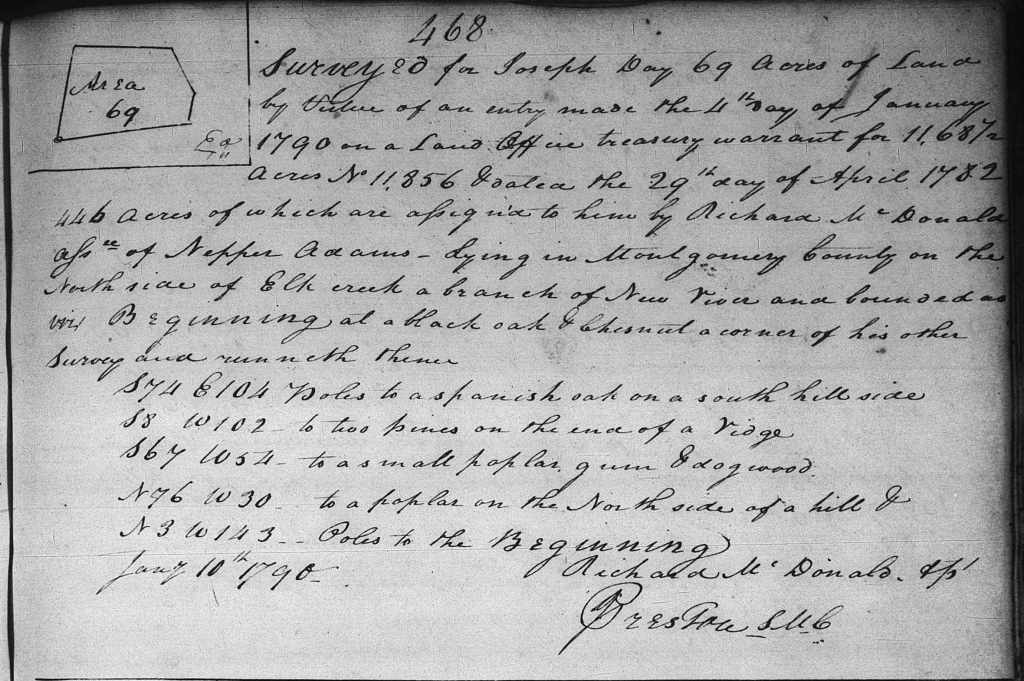
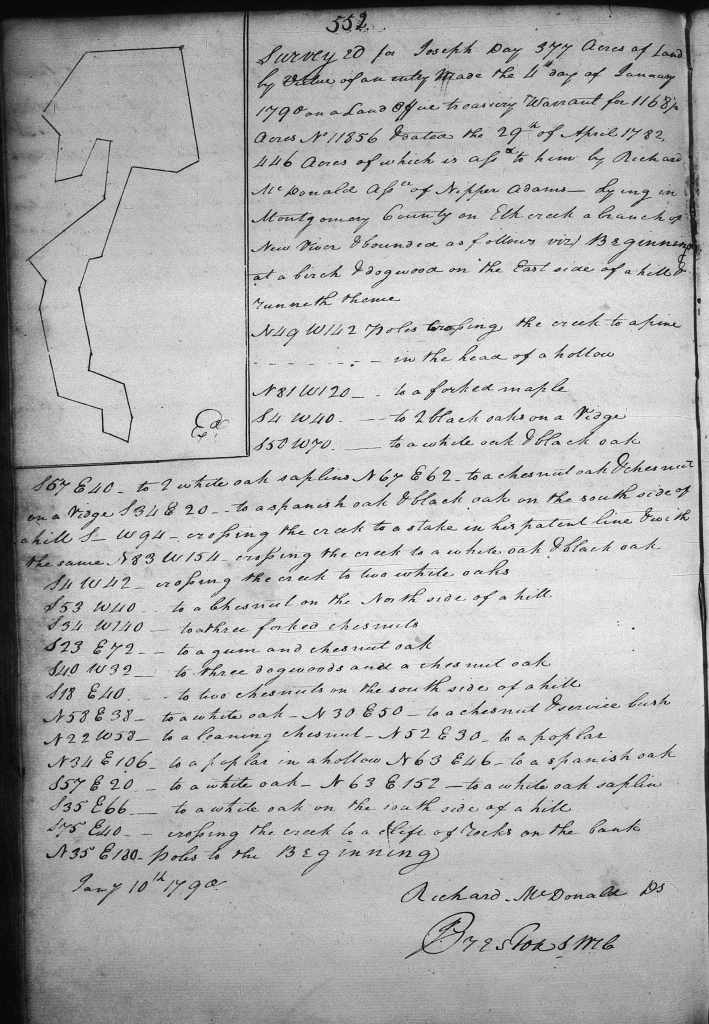
On 4 January 1790, Joseph Day had two surveys in Montgomery County, one for 69 acres and the other for 377 acres. Both were from an entry made on 28 April 1782 by Richard McDonald as assignee of Nipper Adams, land office treasury warrant #11856, 1,1681½ acres. The land was on Elk Creek of New River and was once again surveyed by William Preston. Joseph received both pieces of land on 13 October 1796.[36]
As Kegley’s abstracts of land entries show, prior to his move from Frederick to Montgomery in 1787 and then to Botetourt in 1789-1790, Joseph Day Sr. was claiming land in Montgomery County. I find no deed records for Joseph in the early deed books of Montgomery County.[37]
Two Day families apparently not related to each other or to the family of Joseph Day are found in early Montgomery County records. Neither has a Joseph anywhere in its family tree in the time frame in which Joseph Day appears in that county in the 1780s and 1790s. One of these Day families we’ve met in a previous posting: This is the family of Francis Day, who married Sarah Fry Herbert, widow of William Herbert, prior to September 1776 after William Herbert died there in the summer of 1776.[38] On 2 September 1777, Francis and wife Sarah of Montgomery County filed a document that’s recorded the county’s first deed book, in which Sarah notes that she objected to the will of her late husband William Herbert and claimed her “thirds” in his estate.[39]
Who Francis Day was and where his origins lie are murky, according to Kegley.[40] It seems pretty certain that he was not related either to the Day family to which Joseph belonged or to another Day family found in early Montgomery County records. That family, which included Joshua, John, and William Day, came to Montgomery Country from Lunenburg County, Virginia. John Day bought land in Montgomery on 20 March 1787 from Joseph Howe, with his brother William witnessing the deed.[41] John did name a son Joseph, but that Joseph Day was born in 1783 and is clearly not the man of this name found on the 1789 tax list in Montgomery County. There is no Joseph of the age to be on the 1787-9 tax list anywhere in the family tree of John and William Day.
After settling in Botetourt by 1790, Joseph Day Sr. and his sons begin appearing in records of that county. On 17 June 1794 James Neely Jr. and wife Catherine sold to Joseph Day’s son Evan, all of Botetourt, 79 acres from his 1380-acre tract on Mudlick Creek of the Roanoke, which Evan would then sell to his brother Joseph Jr.[42] William Taylor, David Bailey, Jacob Short, and Joseph Day witnessed the deed with Bailey, Short, and Day proving it at December court 1794. Then on 17 May 1796, Evan bought land from John Bailey, both living in Botetourt.[43]
As I noted previously, Joseph Day Sr. disappears from the Botetourt tax list after 1797, and died the next year. Botetourt court minutes show him bringing suit against James Mason on 14 March 1798, and they state on 8 May 1798 that the suit had been dropped because Joseph had died.[44]
Elsie Davis’s book on the Brooks-Day family (p. 43) has a photocopy and transcription of an obituary of Catherine Yarnell Day that was published in the Lynchburg Virginian on 8 May 1828 (p. 3). It speaks of her husband Joseph Day’s death in Botetourt County, noting that he die “come twenty or thirty years ago” in that county. The obituary identifies Catherine as daughter of Mordecai Yarnell, “who was a preacher among the Friends in the city of Philadelphia.” It notes that Catherine died 3 May 1828 in her 88th year at the home of William G. Gannaway and wife Lydia, Catherine’s daughter.
In 1798, 1799, and 1800, Joseph Day Jr. and his brother Evan are taxed in Botetourt. In 1801, their younger brother John begins to join his brothers on the tax list, evidently having come of age by 1801. The three then continue on the tax list in 1802, 1803, and 1804, and by 1805, Joseph Jr. drops from the Botetourt tax list, having sold his Botetourt land and moved his family to Kentucky.
In 1802, Joseph Jr. bought two tracts in Botetourt. Both purchases were made on 9 February. On that date, he bought from Esom Hannan, both men living in Botetourt, 11¾ acres from Hannan’s 400-acre tract on Lick Branch of the Roanoke.[45] The deed has no witnesses, and Esom proved it at February court.

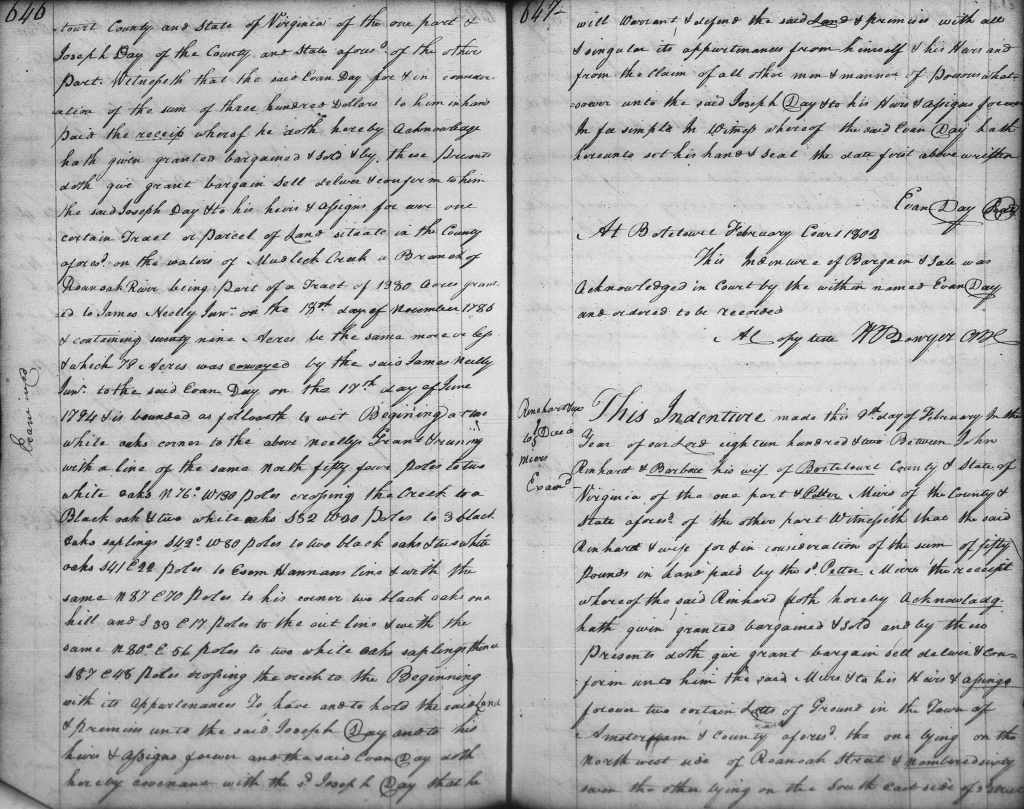
On the same day, Joseph bought from his brother Evan the 79 acres on Mudlick Creek that Evan had bought from James Neely Jr. on 17 June 1794.[46] Evan signed the deed with no witnesses and acknowledged it at February court.
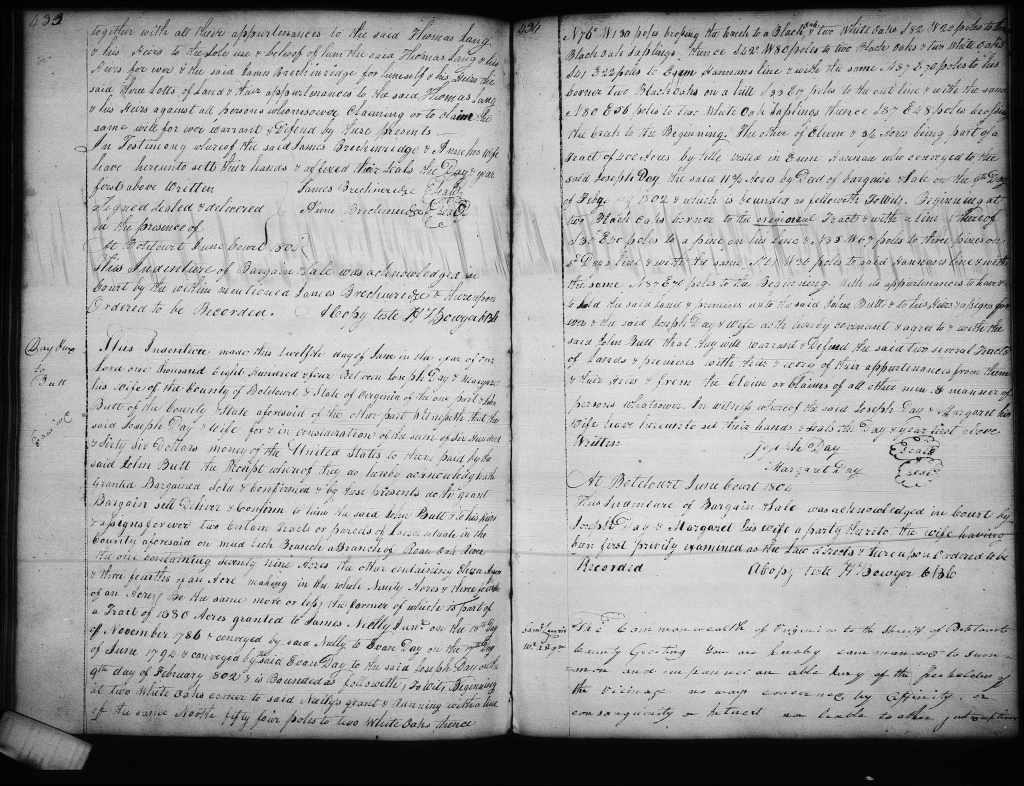
Joseph then sold the Mudlick tract on 12 June 1804, as he left Virginia for Kentucky.[47] The deed states that Joseph Day and wife Margaret sold to John Butt, all parties living in Botetourt, the 79 acres on Mudlick that Joseph had bought from Evan Day. Joseph and Margaret both signed the deed and both acknowledged it at Botetourt court June 1804, an indicator that the family was selling out and leaving for Kentucky.
One final note about a Joseph Day who served in Captain John Stewart’s company under Sergeant Charles O’Hara in Botetourt during Dunmore’s War (1774): This man is not the Joseph Day found in Montgomery County records in the 1780s or 1790s, and is also clearly not the Joseph Day who moved to Botetourt in 1790. He lived in Greenbrier County, Virginia, which was formed from Montgomery and Botetourt in 1778.[48]
In my next posting, I’ll share information about Margaret Brooks and Joseph Day and their family after this family moved to Kentucky.
[1] Kentucky State Historical Society and State Archives, Grayson County, Kentucky, Registry of Deaths 1857, in Kentucky Birth, Marriage, and Death Records, 1852-1910, digitized at the Family Search site.
[2] 1850 federal census, Grayson County, Kentucky, p. 60B (dwelling/family 816; 19 September).
[3] See Find a Grave memorial page for Jacob Wallace Day, Shain cemetery, Short Creek, Grayson County, Kentucky, created by VirJean Potter Bozarth and maintained by Find a Grave. In her book Three Generations of Days and Their Wives: Joseph and Margaret Brooks Day, Joseph and Catherine Yarnell Day, John and Lydia Ross Day (Coronado, California: E.S. Davis, 1994), Elsie Spry Davis suggests that Margaret and Joseph are buried in the Shain cemetery where it’s known their sons Jacob and Jesse are buried, as well as their daughter Rebecca Litsey (p. 5).
[4] Davis, Three Generations of Days and Their Wives, p. 1.
[5] Ibid., p. 8.
[6] Ibid., pp. 31-35, citing minutes of the Nottingham monthly Friends’ meeting, Chester County, Pennsylvania, and the Philadelphia monthly meeting, as well as Harry H. Yarnell and Ruth Brookman Yarnell, A Partial Genealogy of the Name of Yarnall-Yarnell, 1683-1970 (Arvada, Colorado: Harry H. Yarnell, 1970).
[7] Hopewell Friends’ Monthly Meeting Minutes, 1759-1776, p. 174; original records held by Friends Historical Library, Swarthmore College, Swarthmore, Pennsylvania; available digitally at Ancestry.
[8] See Cecil O’Dell, Pioneers of Old Frederick County, Virginia (Westminster, Maryland: Heritage, 2007, p. 208. O’Dell does not cite a source.
[9] Ibid., pp. 205-8. See also William Jolliffe, Historical, Genealogical, and Biographical Account of the Jolliffe Family of Virginia, 1652 to 1893 (Philadelphia: Lippincott, 1893), pp. 66-79.
[10] Jolliffe, Historical, Genealogical, and Biographical Account of the Jolliffe Family of Virginia, pp. 66-79.
[11] Davis, Three Generations of Days and Their Wives, pp. 163-5, citing Hopewell Friends and John W. Wayland, Hopewell Friends History, 1734-1934, Frederick County, Virginia: Records of Hopewell Monthly Meetings and Meetings Reporting to Hopewell; Two Hundred Years of History and Genealogy (Hopewell Monthly Meeting, 1936), pp. 14-16.
[12] See Jolliffe, Historical, Genealogical, and Biographical Account of the Jolliffe Family of Virginia, p. 73.
[13] Frederick County, Virginia, Deed Bk. 21, pp. 916-7.
[14] Ibid., Deed Bk. 20, pp. 307-8. See also Lawson’s release of Joseph and Catherine Day from this mortgage on 17 November 1787, which states that Joseph and Catherine were living on the 6½-acre lot, ibid., Deed Bk. 21, pp. 795-6.
[15] Davis, Three Generations of Days and Their Wives, p. 33.
[16] Hopewell Friends’ Monthly Meeting Minutes, A Record of Births and Burials of Friends Belonging to Hopewell Meeting, Marriages 1758, p. 24; original records held by Friends Historical Library, Swarthmore College, Swarthmore, Pennsylvania; available digitally at Ancestry.
[17] Hopewell Friends’ Monthly Meeting Minutes, 1759-1776, p. 273; original records held by Friends Historical Library, Swarthmore College, Swarthmore, Pennsylvania; available digitally at Ancestry.
[18] Ibid., p. 337; available digitally at Ancestry.
[19] Frederick County, Virginia, Deed Bk. 19, pp. 411-2. See also O’Dell, Pioneers of Old Frederick County, Virginia, p. 182.
[20] See supra, n. 14.
[21] Hopewell Friends’ Monthly Meeting Minutes, 1777-1791, pp. 317-8; available digitally at Ancestry.
[22] Ibid., p. 347; available digitally at Ancestry.
[23] Frederick County, Virginia, Deed Bk.24B, pp. 407-411.
[24] See supra, n. 14.
[25] See supra, n. 13.
[26] Davis, Three Generations of Days and Their Wives, p. 31, citing Frederick County, Virginia, Personal Property Tax Lists, 1782-1850, available digitally at FamilySearch.
[27] Frederick County, Virginia, Personal Property Tax List, 1787, p. 12, available digitally at FamilySearch.
[28] Davis, Three Generations of Days and Their Wives, p. 32.
[29] See Montgomery County, Virginia, Personal Property Tax Lists, 1782-1857, available digitally at FamilySearch.
[30] See Botetourt County, Virginia, Personal Property Tax Lists, 1783-1851, available digitally at FamilySearch.
[31] Davis, Three Generations of Days and Their Wives, p. 1.
[32] Ibid.
[33] See Botetourt County, Virginia, Personal Property Tax List, 1790, available digitally at FamilySearch.
[34] Montgomery County, Virginia, Plat Bk. B, p. 147. See also Kegley, Early Adventurers on the Western Waters, vol. 2 (Orange, Virginia: Green, 1982), p. 46, citing Montgomery County, Virginia, Entry Book A, p. 74.
[35] Kegley, Early Adventurers on the Western Waters vol. 3, p. 54, citing Montgomery County, Virginia, Entry Book B, p. 305.
[36] Montgomery County, Virginia, Plat Bk. D, pp. 468, 552; and Virginia Land Office Grant Book 36, p. 329, and Book 37, pp. 91-2.
[37] For Book A, see James L. Douthat, comp., Montgomery County, VA, Deed Book A 1773-1789 (Signal Mountain, Tennessee: Mountain Press, 1987). I’ve also gone through the index (grantor and grantee) for Montgomery County deeds at FamilySearch (this is locked unless you use a computer within the Family History Library system) for references to Joseph Day, and find no deeds for him.
[38] See Kegley, Early Adventurers on the Western Waters, vol. 3, pt. 1 (Marceline, Missouri: Walsworth, 1995), pp. 273-283.
[39] Montgomery County, Virginia, Deed Bk. A, pp. 165-6.
[40] Kegley, Early Adventurers on the Western Waters, vol. 3, p. 282.
[41] Montgomery County, Virginia, Deed Book A, pp. 423-4.
[42] Botetourt County, Virginia, Deed Bk. 5, p. 181.
[43] Ibid., Deed bk. 6, p. 145.
[44] Botetourt County, Virginia, Court Order Book 1797-1800, pp. 152 and 173.
[45] Botetourt County, Virginia, Deed Bk. 7, pp. 644-5.
[46] Ibid., pp. 645-6.
[47] Ibid., Deed Bk. 8, pp. 433-4.
[48] See William Armstrong Crozier, Virginia Colonial Militia, 1651-1776, vol. 2 (New York 1905; repr. Baltimore: Clearfield, 2000), p. 86, citing Draper ms. 2ZZ,40; and James Edward Day, Descendants of Christopher Day of Bucks County, Pennsylvania (Los Angeles, California, 1959), pp. 21-2.
4 thoughts on “Children of Thomas Brooks (abt. 1747 – 1805) and Wife Margaret: Margaret Brooks (1772 – 1857) and Husband Joseph Day”